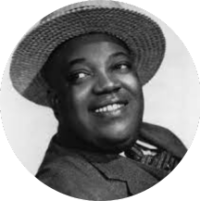
Jimmy Rushing, affectionately known as “Mr. Five By Five” due to his stout stature, was a groundbreaking figure in the world of blues and jazz. Born on June 15 or August 26, 1899 (though he often cited a 1901 birth-date), in Oklahoma City, James Andrew Rushing pioneered the big band blues belting style, leaving an indelible mark on the genre and influencing subsequent blues shouters like Big Joe Turner, Wynonie Harris, and Roy Brown. Inspired by an uncle, Rushing began his blues journey in California in 1923, where he played piano with Jelly Roll Morton before returning to Oklahoma.
He sang in various territory bands, including Walter Page’s Blue Devils, and joined Bennie Moten’s Kansas City Orchestra, marking the beginning of his association with legendary jazz figures. Rushing recorded or performed with luminaries such as Count Basie, Buck Clayton, Benny Goodman, Dizzy Gillespie, Earl “Fatha” Hines, and others. He was the vocalist on the Johnny Otis orchestra’s inaugural record in 1945 and reunited with Otis at the 1970 Monterey Jazz Festival. Rushing’s pivotal recordings with the popular Basie band, starting in 1935, catapulted him to national prominence. Hits like “Good Morning Blues,” “Going to Chicago,” and “Sent for You Yesterday and Here You Come Today” showcased his commanding vocal presence and marked him as a leading figure in the big band era. He played a significant role in bringing blues to a broader audience. After moving to New York City in the 1950s, Rushing continued his prolific recording and touring career.
He worked with various labels, including Vanguard, Columbia, ABC BluesWay, and RCA, releasing albums like “Livin’ the Blues” and “The You and Me That Used to Be.” Despite battling leukemia in his final years, Rushing continued to receive accolades, posthumously winning a Down Beat magazine poll as Best Male Singer shortly after his death in June 1972. Rushing’s contributions to blues and jazz were immeasurable, bridging the gap between the genres and influencing a wide array of singers. Although recognition may have faded among more recent generations of blues enthusiasts, his impact on blues, jazz, pop, and rhythm & blues remains undeniable. Rushing’s career reached far and wide, spreading the appeal of the blues to a broader audience than ever imagined.
